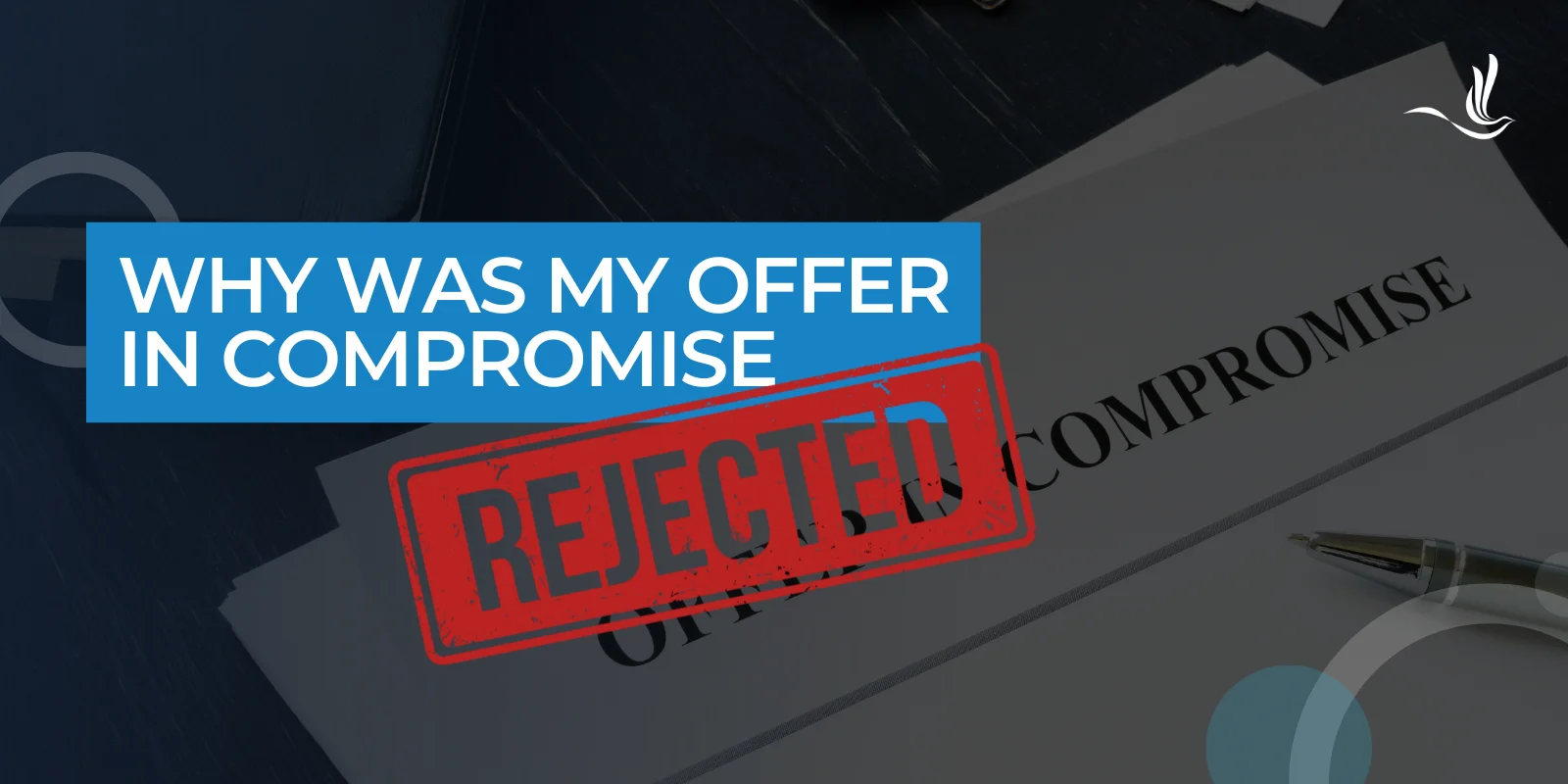Key Takeaways
An Offer in Compromise allows taxpayers to settle IRS debt for less than they owe, but approval depends on strict financial and compliance criteria.
Most OIC rejections occur because the offer is below the IRS’s reasonable collection potential or the application contains incomplete or inaccurate financial information.
The IRS only considers OICs from taxpayers who have filed all required returns, are current on tax payments, and can fully document their financial hardship.
Returned OICs involve fixable submission errors, while rejected OICs indicate the IRS determined the offer does not meet approval standards.
After a rejection, taxpayers can appeal, submit a stronger revised offer, or pursue other IRS relief options like installment agreements or penalty relief.
Preparing accurate documentation, staying compliant, and working with a tax professional significantly increases the chances of OIC approval.
Facing tax debt can be overwhelming, and the IRS offers several programs to help taxpayers settle their liabilities. One of the most effective tools is an Offer in Compromise (OIC), a legal agreement that allows taxpayers to pay less than the full amount owed. But not every OIC gets accepted. If your offer in compromise was rejected, it’s crucial to understand why and what steps you can take next.
This article will explain what an OIC is, common reasons for rejection, the difference between returned and rejected applications, and strategies to improve your chances of approval.
Understanding an Offer in Compromise (OIC)
Before diving into reasons for rejection, it’s important to understand the OIC itself. Knowing how the IRS evaluates these offers can clarify why many applications fail.
What Is an Offer in Compromise?
An Offer in Compromise is a settlement program the IRS uses to resolve tax debts when paying the full amount would create a financial hardship for the taxpayer. Essentially, it allows taxpayers to settle their obligations for less than the total owed.
To qualify, a taxpayer must demonstrate that they are unable to pay their tax liability in full, either through lump sum or installment payments. The IRS’s goal is to maximize collection while balancing the taxpayer’s ability to pay.
For example, if a taxpayer owes $50,000 but can only reasonably pay $15,000 based on income, assets, and expenses, the IRS may accept an OIC for the lower amount. However, acceptance is not guaranteed, and many applications are rejected due to strict evaluation standards.
How the OIC Process Works
Understanding the process is crucial because most rejections stem from missteps during submission or evaluation.
The process begins with the application submission. Taxpayers must complete IRS Form 656, including a detailed financial disclosure (Form 433-A or 433-B), and submit all documentation accurately and fully. During the initial IRS review, the agency checks the application for completeness. Errors or missing documents can lead to the OIC being returned.
Once the application passes the initial review, the IRS performs an in-depth analysis, calculating your reasonable collection potential (RCP), which represents the amount the IRS believes you can pay based on assets and future income. Finally, the IRS issues a decision to accept, reject, or return the application for corrections. The OIC process typically takes 6-12 months from submission to final decision. Understanding these steps helps taxpayers anticipate potential pitfalls and avoid common mistakes that lead to rejection.
Common Reasons an OIC Is Rejected
Even carefully prepared offers are sometimes denied. Understanding why your offer in compromise was rejected can guide your next actions.
Insufficient Offer Amount
The IRS compares your proposed settlement to your reasonable collection potential (RCP). If your offer is below the amount the IRS determines you can pay, your OIC will likely be rejected.
Let’s look at an example. A taxpayer with $20,000 in bank savings and steady monthly income proposes an OIC for $5,000. The IRS calculates the RCP at $18,000, meaning the offer is too low, and the application will be rejected.
Incomplete or Incorrect Application
One of the most common reasons for rejection is an incomplete or inaccurate application. Missing signatures, unsubmitted supporting documents, or misreported income can all trigger denial.
Ensuring every financial statement, bank statement, and income report aligns with your OIC forms is critical. Even small inconsistencies can cause rejection.
Noncompliance With Tax Filing and Payment Requirements
The IRS only considers OICs from taxpayers who are compliant. This means all required tax returns must be filed, and estimated tax payments or installment agreements must be current.
Failing to meet these requirements automatically increases the likelihood that your offer in compromise will be rejected.
Financial Ability to Pay
The IRS may reject an OIC if it determines you can pay your debt in full through other means. This could include selling assets, using savings or investments, or increasing monthly payments over time. Overstating expenses or understating income rarely helps, as the IRS has strict criteria to assess what a taxpayer can realistically afford.
Prior OIC History or Other IRS Concerns
Taxpayers with previous rejected OICs or ongoing audits may face additional scrutiny. The IRS may deny new offers if they suspect noncompliance or misrepresentation in prior submissions.
For example, a taxpayer who had a rejected OIC for a similar debt two years ago and now submits a new application with only minor adjustments may see the new offer rejected for insufficient changes or evidence.
Returned vs. Rejected OICs: Understanding the Difference
Taxpayers often confuse “returned” and “rejected” OICs. Knowing the distinction can influence how you respond.
Returned OIC
A returned OIC occurs when the IRS finds errors or omissions in your submission. It is essentially sent back for correction. Missing financial documentation, incorrect or unsigned forms, or unpaid application fees can all result in a returned OIC.
A returned OIC is not a final denial. Correcting the errors and resubmitting promptly can still result in acceptance.
Rejected OIC
A rejected OIC means the IRS has evaluated your application and determined it does not meet the acceptance criteria. This can happen if your offer is below reasonable collection potential, you fail to meet compliance requirements, or your financial hardship is not sufficiently documented.
Once rejected, your options include appeal or resubmission with significant adjustments. A rejection indicates that the IRS believes your offer does not satisfy the requirements for acceptance.
What Happens After an OIC Is Rejected
Receiving a rejection letter can be discouraging, but it is not the end of the road. Understanding the IRS process post-rejection helps you take effective next steps.
Notification from the IRS
The IRS sends a letter explaining the outcome of your OIC. It outlines the amount owed versus the amount offered, the reason or reasons for rejection, and the options available for pursuing further action. Reading this notification carefully is essential because it guides your response and informs your strategy for an appeal or resubmission.
Options After Rejection
After an offer in compromise is rejected, taxpayers can pursue several paths. They may request an appeal with the IRS Office of Appeals to present additional evidence or clarify misunderstandings. Submitting a new OIC is also an option if circumstances have changed, ensuring that the new application addresses the IRS’s prior concerns. Alternatively, taxpayers can explore other IRS resolution programs such as installment agreements, partial payment plans, or penalty abatements.
Appealing a Rejected Offer in Compromise
If your offer in compromise has been rejected, you may still have an opportunity to appeal. The Internal Revenue Service (IRS) allows you to request a review by its Independent Office of Appeals within 30 days of the rejection date. Your appeal must be sent to the specific IRS office listed on your rejection letter and should include either a completed Form 13711 or a written protest outlining your disagreement, the tax periods involved, and the facts and legal basis supporting your position. You should also compare the financial figures in your original OIC submission to the Income/Expense (IET) and Asset/Equity (AET) Worksheets provided by the IRS and submit documentation disputing any amounts you believe are incorrect.
How to Avoid OIC Rejection Before Filing
Proactive preparation is the best way to prevent an OIC rejection. Understanding what the IRS looks for and submitting a complete, accurate application can significantly improve your chances.
Ensure Accurate and Complete Documentation
Before filing, gather all necessary financial records including bank statements, pay stubs, investment accounts, and debt obligations. Carefully verify all numbers on Form 656 and supporting documents. Inconsistencies between reported income and expenses, or omissions of any sources of income, can lead to immediate rejection. Accurate and complete documentation is critical to demonstrating your financial situation accurately.
Meet IRS Compliance Requirements
The IRS will not consider an OIC from a taxpayer who is not in compliance. Filing all outstanding tax returns, staying current on taxes due, and ensuring any installment agreements are up to date are essential steps before submission. Demonstrating compliance shows the IRS that you are acting in good faith and strengthens your application.
Work With a Tax Professional
Working with a tax professional can increase the likelihood of approval. In fact, well-prepared applications with professional guidance have significantly higher acceptance rates than the overall average. A professional can review your financial information for accuracy, calculate your reasonable collection potential, and draft a persuasive OIC that meets IRS criteria. Their expertise is particularly valuable for complex cases, such as multiple years of tax debt, significant assets, or past rejections. Professionals can also guide you through the appeal process if your OIC is rejected.
Having your offer in compromise rejected can feel discouraging, but it is not the end of the process. Most rejections occur due to offering less than what the IRS calculates as reasonable, incomplete or inaccurate documentation, or failure to meet compliance requirements. Understanding the reasons behind a rejection allows taxpayers to make informed decisions about appeals, resubmissions, or alternative resolution options.
Frequently Asked Questions
What are common OIC mistakes? Common OIC mistakes include submitting incomplete financial documents, misreporting income or assets, failing to file all required tax returns, and offering an amount below the IRS’s calculated reasonable collection potential. These errors often lead to delays, returns, or outright rejection.
Why would an Offer in Compromise be rejected? An Offer in Compromise is typically rejected when the IRS determines the taxpayer can afford to pay more than they offered, the application is incomplete, or the taxpayer is not in full filing and payment compliance. Even small inconsistencies in income or expenses can lead to denial.
What does IRS look at for offer in compromise? The IRS evaluates a taxpayer’s income, assets, expenses, and future earning potential to determine their reasonable collection potential. They also review tax filing compliance, financial accuracy, and whether the offer reflects the taxpayer’s true ability to pay.
How does OIC work? An Offer in Compromise works by allowing taxpayers to settle their tax debt for less than the full amount, based on their financial ability. The IRS reviews detailed financial information, calculates reasonable collection potential, and either accepts, rejects, or returns the offer.
Tax Help for People Who Owe
By carefully preparing your application, ensuring compliance, and considering professional guidance, you can improve your chances of getting an OIC approved. A rejection is an opportunity to adjust, correct, and ultimately find a path to resolving your tax debt. With the right approach, taxpayers can achieve financial relief and move forward with confidence. Optima Tax Relief is the nation’s leading tax resolution firm with over a decade of experience helping taxpayers.
If You Need Tax Help, Contact Us Today for a Free Consultation



























